Tanya Habjouqa, winner of the World Press Photo Award 2014, is a founding member of the all-female Middle Eastern photography collective Rawiya (meaning “she who tells a story”) which focuses on raising the visibility of female Arab photographers as well as presenting an insider’s view of the region, and defying Western stereotypes of the Middle East.
Of Texan-Jordanian ancestry, Habjouqa’s work has been exhibited worldwide and is in the collections of MFA Boston, Institut du Monde Arab, and the Carnegie Museum of Art. Now based in Jerusalem, her latest project is Occupied Pleasures, a book combining original poetry and Palestinian proverbs, with images from her 2014 World Press Photo Award-winning series. It offers anthropological accounts of life across the occupied Palestinian territories – humorous and sometimes even satirical recordings of Palestinians’ everyday existence. Time Magazine and The Smithsonian acclaimed the American edition as one of the photo books of 2015.
 THEMBI MUTCH: How do you get access to the subjects in your photographs?
THEMBI MUTCH: How do you get access to the subjects in your photographs?
TANYA HABJOUQA (pictured right): I’ve always got access by sharing myself and connecting, in the sense that I talk to people, properly. I give time, share my life with them. Some photographers just shoot, shoot, shoot. It’s through spending time with people that I achieve a connection, a poetic thing, giving of myself. In the Middle East, it helps I speak Arabic, I’m Jordanian, I’m married to a Palestinian, I have children. A lot of my work I did when I was pregnant and that definitely helped me to relate to people and them to me. There’s an infestation of journalists here, it’s like Vikings, running around saying to everyone, “tell us about yourself”, it’s a hyper-narrated place. I can connect as a mother, so I do, I give of myself. There’s a hospitality that’s unrivalled, people are warm, but they’re also wary. I don’t want to talk in stereotypes, but yes, people are warm, welcoming. So another technique I use is to connect via social media, like Facebook, Twitter, people can see my life, my kids, my family. Younger women and girls view me on Facebook, they check me out, and it’s easier. Sometimes my friends say: “you’re becoming friends with a potentially horny 17-year-old boy!”, but why should I be so precious? I need to give of myself if I am taking as well.
How did the book come about?
Issues around Israel and Palestine are almost always broached in a reductionist manner, where Palestinians are either victims or proponents of violence, and rarely with the nuanced context needed. It’s one of the most covered and media-scrutinised areas in the world but journalists are often timid and paranoid in how they portray its reality. To borrow from the title of a superb work by Edward Said, by marrying into this conflict and having children here, it gave me “Permission to Narrate”, to say things more directly, and to explore in my work a more overt social documentary. The photo series stemmed from an interview in 2009 with the groom featured in the wedding photograph glued to a rust-coloured wall. Having fallen in love with his Jordanian bride on Skype, the groom snuck her through the tunnels to Egypt, embracing her in what he describes as a scene snatched from a Bollywood film. He said to me, “No matter what this occupation does to us or takes, we will always find a way to live and love. And maybe even laugh. ”
How does living in the area, rather than just visiting, change the way you work?
The narrative of the Middle East is almost always told in the same tired tropes. The journos ask people to spill their guts, they open wounds, and then they go home. It is traumatic and harmful, and contributes to dehumanizing and the utter lack of knowledge of various Middle East communities. One of the facets of “othering” people is to strip them of diversity and vibrancy, and so it’s the vibrancy I reinstate: the humanity, the complexity, the contradictions of real people. We need a sophisticated and more nuanced conversation. If you can present people in their complexity audiences, readers, viewers can relate to them much more, so this is what I’m striving to do. Occupied Pleasures arose more from dissatisfaction with a tired narrative that didn’t represent the daily reality of Kafka-esque checkpoints and militarised limited movement. Ultimately, it was my marriage to a Palestinian and having children that motivated me to take different photos for a personal project. Having children who will inherit the heavy weight of this narrative, I wanted to find a way to explore it and celebrate the impressive human side of how the Palestinians, despite almost 49 years of occupation, have kept their humanity, civil society, and respect for one another as a people.
When do you experience your dilemmas?
If something feels dirty or wrong I just won’t do it. If something is going to hurt someone or put them in danger I won’t do it. I think it’s implicit that I won’t hurt people. I did a recent assignment about the American settlers in the West Bank. Getting access to the settlers, I connected as a mother, a human. What genuinely surprised me was how much on a personal human level I was able to connect. But there were always others who blew my mind, and who presented real existential crisis to unpack. I took one photo from a kitchen of a Israeli soldier. The view from the window was of a Palestinian village. I was trying to be nuanced, not in your face. In the end, I will always put the camera down rather than compromise someone else.
Pictured below: Gaza City, Gaza. High school students enjoy a field trip on the Mediterranean Sea off the coast of Gaza, where a ten-minute boat ride is the epitome of freedom. Gazans are only rarely allowed to travel outside of the enclave and access to Israel is only permitted on special humanitarian grounds since the Gaza blockade began in June 2007. Israel and Egypt largely closed their borders with Gaza following the election of Hamas into government. All boats, including fishermen's craft, are only allowed to venture six nautical miles off the coast.

What about your own compromises? Do you ever feel compromised by what you’re being asked to do?
I have not, so far, been put in the situation where I’ve been responsible for portraying as humane someone who is doing something basically wrong. But I would be a shit journalist if I came in and pushed my politics to the fore. I find it more fascinating to understand what’s motivating people. So, for example, if I do an assignment with settlers, I want to know where they are coming from, emotionally. I’m being more of an anthropologist, but I’m not doing their PR. I have clear limits. I won’t for example work with a publication that doesn’t use the word “occupied” or “occupy” and just refers to Israel when covering the Occupied Territories. I will interfere if an article is skewed wrong or presents an overall angle that isn’t right. Over the years, I find myself becoming increasingly dissatisfied with a redundancy in assignments from various publications that seemed to simply reiterate the clichés and even grossly diminish the effects of occupation. I was often asked to do the same stories, diminishing the numbers of Christians struggling in Muslim-majority Bethlehem, despite the fact both Muslim and Christian Palestinians are equally struggling for their rights. When a complex story would appear, such as a friendship formed between a Palestinian from the West Bank and an Israeli Jew in cancer treatment, or an Israeli Jewish woman visiting her friend in her West Bank home, imagery that spoke to the intimacy of friendship, these things were pushed out of the edit. The simpler, more black and white story was chosen, using the same imagery of walls and check points without context. Not the one which favoured complexity.
Are people tired of journalists in the Middle East region?
People are very cynical, they’ve been talking to journalists for ages. And nothing changes. I think we’re tired of the way the Middle East is talked about! It’s framed in very simplistic, or inaccurate ways. One issue, as a woman from this region, that I personally am incredibly tired of, and find orientalist, reductionist, simplistic, and outright baffling, is the western/northern inordinate obsession with women in hijab. I mean, look, we are talking about a shocking period of tumult, of occupation, displacement, breakneck geo-political developments, utter violence in Iraq and Syria, the rise of a terrorist entity that has access to selling oil and the creation of a state. In that light, why discuss women in hijab? It is such a non-issue for me. Your average Middle-Easterner or enlightened traveller, journalist or academic, will not focus on it. Well, unless it is intended to sell – sex sells. When talking about the Middle East, the veil sells. The same picture, of a woman on a beach peering to sea with hair showing versus a woman in hijab staring at the sea will illicit different intrigue and publishing options. It is not interesting. I wish we could go past this. I don’t associate the hijab with oppression.
Is it fair to say that people living in occupied territories are actually increasingly engaged with the power dynamics, so they feel, “If I give you my heart, my time, and access, I want something back”. Do you get that?
Yes, people are tired. There’s a political obligation for people here to talk, and so many of the photos in Occupied Pleasures took so many hours, so much work. They wanted to know if I had an agenda. There was an initial reservation – do you want to talk me about pleasure? Pleasure, under occupation? Seriously?
How has winning a World Press Photo Award in 2014 changed things?
In the last few years, by having recognition by World Press Photo, it opened a lot of doors. Suddenly I’m being invited to judge, be on panels. It’s a game changer. Suddenly my family gets it – “she’s not just out there taking pictures. She’s doing something!” And also for the people I photograph, the award makes a difference. When working with Syrian refugees or Palestinians whose husbands have been killed, they don’t give a damn, but some of the more upper class individuals, they see I’m not just another freelancer. I’m contributing to, and changing the global conversation about representation of the Middle East. I give talks, masterclasses, get invited around the world. I can speak out and change the conversations about occupied territories and other Middle East issues. I can narrate. I can choose the terms.
- Occcupied Pleasures by Tanya Habjouqa is published by Fotoevidence
Overleaf: browse a captivating gallery of Tanya Habjouqa from Occupied Pleasures
Click on the thumbnails to enlarge




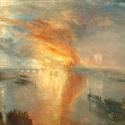

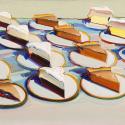


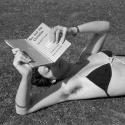
![SEX MONEY RACE RELIGION [2016] by Gilbert and George. Installation shot of Gilbert & George 21ST CENTURY PICTURES Hayward Gallery](/sites/default/files/styles/thumbnail_125_x_125_/public/mastimages/Gilbert%20%26%20George_%2021ST%20CENTURY%20PICTURES.%20SEX%20MONEY%20RACE%20RELIGION%20%5B2016%5D.%20Photo_%20Mark%20Blower.%20Courtesy%20of%20the%20Gilbert%20%26%20George%20and%20the%20Hayward%20Gallery._0.jpg?itok=3oW-Y84i)
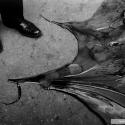
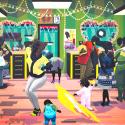
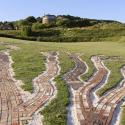
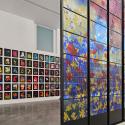
Add comment